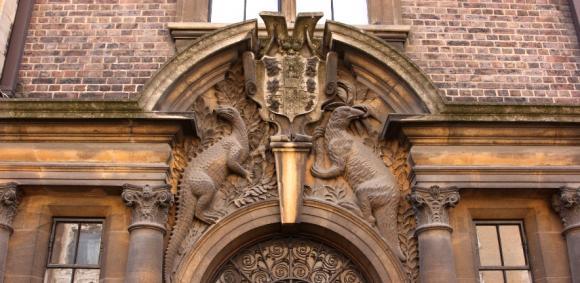
Two Cambridge Earth Scientists have been awarded UKRI Future Leaders Fellowships to help them develop innovative research projects.
Dr Owen Weller and Dr David Wallis will be working on solutions to some of the world’s key challenges; from developing new technologies to identify valuable metal deposits required for a low carbon future, to improving our understanding of how rocks deep beneath Earth’s surface influence climate and earthquake hazards.
The UKRI initiative aims to support a new cohort of the UK’s most talented researchers, enabling them to work across disciplines to tackle key global issues. The Cambridge researchers will be backed by £2.8 million to help set-up their team, fund world-class equipment and kick-start their research.
Dr David Wallis
Dr Wallis, Lecturer at the Department of Earth Sciences, was awarded for his project entitled, ‘Microphysics of evolving rock viscosity in the seismic and glacial cycles’, which aims to resolve how movements of rocks deep in Earth’s interior influence earthquake hazards. The flow of these deep, hot rocks is thought to be one factor controlling when and where earthquakes strike.
“I’m delighted to receive the Future Leaders Fellowship, which will allow us to undertake some really novel experiments and observations to help us figure out what goes on tens to hundreds of kilometres beneath our feet,” said Wallis.
The need to understand the deep-Earth movements of rocks over human timescales is especially pressing, as populations are increasingly exposed to earthquake risk.
By studying the flow of rocks deep in the Earth’s mantle, David also hopes to shed light on how Earth’s surface shifts when ice sheets melt, causing the ground to rise as the weight of the ice is removed. Information like this is key for climate modellers, as it might impact rates of ice loss and sea-level rise.
New models generated by the project will be incorporated into large-scale simulations of seismicity and glacial cycles to improve assessments of seismic hazard and the impacts of human-induced climate change.
Dr Owen Weller
Dr Weller, Lecturer at the Department of Earth Sciences and Fellow at Sidney Sussex, received the Fellowship for his project titled ‘Towards a process based understanding of rare-earth element deposits’, which aims to develop our understanding of how rare-earth elements (a group of 17 elements) become enriched in certain igneous rocks. These elements are a critical component of the many high-tech devices on which our society depends and, with their use in batteries for electric cars and magnets for wind turbines, will underpin our transition to a low-carbon future.
“I am thrilled and honoured to receive the Fellowship, excited to collaborate with an excellent team on this project, and highly motivated by the opportunity to work on a problem of urgent societal importance," said Weller.
Owen’s project will investigate what factors influence how rare-earth elements become enriched in rare ‘carbonatite’ and ‘alkaline’ igneous rocks, with the aim of finding new and diverse deposits to expand our current supply -- the majority of which is sourced from China.
Owen will be developing computational models to understand how these unusual rocks form and predict where deposits might be found. He will also work with industry partners to develop methods of identifying the deposits using remote sensing (airborne) techniques.
A key element of the project will involve analysing the alteration zones—termed ‘fenites’—that surround these rare igneous rock types. A better understanding of these alteration zones will allow them to be used as (larger) targets for rare-earth element exploration.
UK Research and Innovation Chief Executive, Professor Dame Ottoline Leyser, said: “Future Leaders Fellowships provide researchers and innovators with freedom and support to drive forward transformative new ideas and the opportunity to learn from peers right across the country.
"The fellows announced today illustrate how the UK continues to support and attract talented researchers and innovators across every discipline to our universities and businesses, with the potential to deliver change that can be felt across society and the economy."
